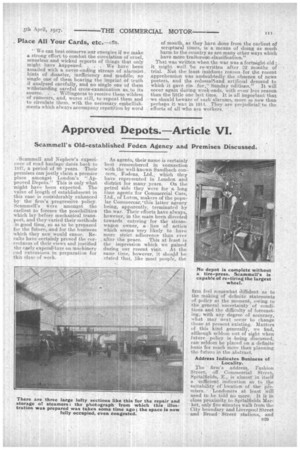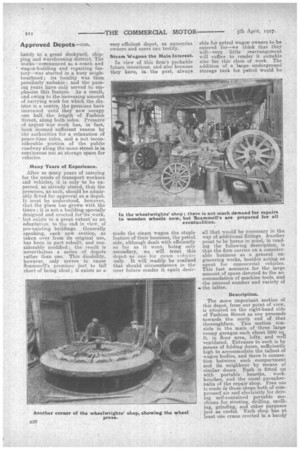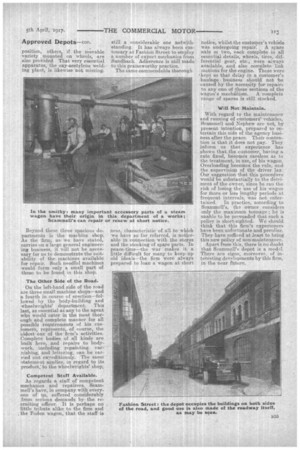Approved Depots.—Article VI.
Page 5

Page 6

Page 7

If you've noticed an error in this article please click here to report it so we can fix it.
Scammell's Old-established Focien Agency and Premises Discussed.
Scammell and Nephew's experience of road haulage dates back to 1837,a period of 80 years. Their premises can justly claim a premier place amongst London's "Approved Depots." This is only what might have been expected. The value of length. of establishment in this case is considerably enhanced by the firm's progressive policy. Seammell's were amongst the earliest to foresee the possibilities which lay .befOre mechanical transport, and they-varied their methods in good time, so as to be prepared for the future, and for the business which they saw would ensue. Results have certainly proved the correotness of their views and justified the early expenditure on machinery and extensions in preparation for this class of work. As agents, their -name is certainly best remembered in 'connection with the well-known Sandbach concern,. Fodens, Ltd., which they have represented in London and district for many years. On the petrol side they were for a long tune agents for Commercial Cars, Ltd., of Luton, makers of the popular Commercar,' this latter agency being, apparently, terminated by the war. Their efforts have always, however, in the main been directed towards catering for the steamwagon owner, a line of actiOn which seems very likely to have more strict. adherence than ever after the peace. This at least is the impression which we gained during our recent visit. At the same time, however, it should be stated that, like most people, the
firm feel somewhat diffident as to . the making of definite statements of policy at the moment, owing to the general uncertainty of conditions and the difficulty of forecasting, with any degree of accuracy, what may next occur to change those at present existing. Matters of this kind generally, we find, although seldom out of sight when future policy is being discussed, can seldom be placed on a definite basis for much more than planning the future in the abstract.
Address Indicates Business of Locality.
The firm's address, Fashion Street, off Commercial Street, Spitalfields, E. is almost in itself a sufficient indication as to the suitability of location of the pi;,2mises. ' Londoners at least will ,need to be told no more. It is in close proximity to Spitalfieids Market, only five aninutes walk from the City boundary and Liverpool Street and Broad Street stations, and handy to a great dockyard, shipping and warehousing district. The Works—commenced as a -coach and wagon-building and repairing factory—was started in a busy neighbourhood; its locality was then peculiarly suitable ; and the passing years have only served to emphasize this feature. As a result, and owing to the increasing amount of carrying work for which the district is a centre, the premises have increased until they now occupy one half the length of Fashion Street, along both sides. Pressure of urgent war work has, in fact, been deemed sufficient reason by the authorities for a relaxation of peace-time rules, and a net Moonsiderable _ portion of the public roadway along the same street is in continuous use as storage space for vehicles.
Many Years of Experience.
After so many years of catering for the needs of transport workers and vehicles, it is only to be expected, as already stated, that the premises, as such, should be admirably.fitted for approval as a depot. It must be understood, however, that the place has grown with the times ; it is not a building.specially designed and erected for'its.,work, but exists to a great extent as an adaptation, to the end in view, of pre-existing buildings. Generally speaking, each new section, as taken over from its original use, has been in part rebuilt, and considerably modified ; the result is nevertheless a series of depots rather than one. This disability, however, only serves to cause Seammell's premises just to fall short of being ideal; it exists as a
very efficient depot, as numerous owners and users can testify.
Steam Wagons the Main Interest.
In view of this firm's probable future intentions, and also because they have, in the past, always made the steam wagon the staple feature of their business, the petrol side, although dealt with efficiently so far as it went, being only secondary, we will treat this depot as one for steam vehicks only. It will readily be realized that should circumstances in the near future render it again desir able for petrol wagon owners to be catered for—we think that they will—very:, little rearrangement Will suffice to render it suitable also for this dais of work. The addition of a large underground storage tank for petrol would be all that would be necessary in the way of additional fittings. Another point to be borne in mind, in reading the following description, is that the firm carries on a considerable business as a general engineering works, besides acting as agent for commercial vehicles. This fact accounts for the large amount of space devoted to the accommodation of machine tools, and the unusual number and variety of the latter.
. Description.
The more important section of this depot, from our point of view, is situated on the right-hand side of Fashion Street as one proceeds towards the north end of that thoroughfare. This section consists in the main of three large roomy garages each about 3500 sq. ft. in floor area, lofty, and well ventilated. Entrance to each is by means of folding doors, sufficiently high to accommodate the tallest of wagon bodies, and there is connection between each compartment and its neighbour by means of similar doors. Each is fitted up with portable hearths, workbenches, and the usual paraphernalia of the repair shop. Free use is made in these shops both of compressed air and electricity for driving self-contained portable machines for riveting, drilling, caulking, grinding, an other purposes just as useful. Each shop has at least one crane erected in a handy
position, others, if the movable variety , mounted on wheels, are also provided. That very essential apparatus, the wry-acetylene welding plant, is likewise not missing.
Beyond these three spacious de-. partrnents is the machine shop. As the 'firm, aswe have stated, • carries on a large general engineering business, it will not be necessary. for us to demonstrate the suitability of the machines available for repair. Such needful machines would form only a small part of these to be found in this shop.
The Other Side of the Road.
On the left-hand side of the road are three small machine shops—and a fourth in course of erection—followed by the body-building and
department. This last, as essential as any to the agent who would eater in the most thorough and complete manner for all possible requirements of his customers, represents, of course, the oldest one of the firm's activities. Complete bodies of all kinds are built here, and repairs to bodywork, including repainting. -varnishing, and lettering, can be carried out exeeditiously. The same' statement applies, in regard to its product,' to the wheelwrights' shop.
Competent Staff Available.
As regards a staff of competent mechanics and repairers, Scammell's have, in company with everyone of us, suffered considerably from serious demands by, the recruiting officer. It is perhaps no . little tribute alike to the firm and , the Foden wagon, that the staff is
still a considerable one notwithstanding. It has always been customary at Fashion Street to employ a number of expert mechanics from Sandi:loch. Adherence is still made to this praiseworthy practice.
The same commendable thorough ness, characteristic of all-to which we have so far referred, is noticeable in connectioii with the stores and the stocking of spare parts. In peace-time—the war makes it a little difficult for many to keep upold ideals—the firm were always prepared to loan a wagon at short notice, whilst the customer's vehicle was undergoing repair. A spare axle oi two, each complete in all essential details, wheels, tires, differential gear, etc., were always available, and also complete link motions for the engine. These were kept so that delay in a customer's haulage business should not be caused by the necessity for repairs to any one: of ',these' sections of the wagon's mechifiism. A complete range of spares is still stocked.
Will Not Maintain, .
With regard to the maintenanceand running of customers' vehicles, Searnmell and Nephew are not, by present intent-ion, prepared to entertain this side of the agency business after the peace. Their contention is that it does not pay. They inform us that experience has shown that the eusterner' having a rate fixed, becomes -careless as to the treatment, in use, of his wagon. Overloading becomes the rule, and the supervision of the driver lax. Our suggestion that this procedure would be substantially to the detriment of the owner, since he rap the risk of losing the use of his wagon for more or less lengthy period-s at frequent intervals, was not entertained. In practice, according to Scrainmell's, the owner considers only the maximum tonnage ; he is unable to be persuaded that aueh a . policy is short-sighted. We should, think that this firm's experiences have been unfortunate and peculiar. They have sufficed at .least to bring this new policy of non-maintenance.
Apart from this, there is no doubt that Searnmell's depot is a model. There are signs, moreover. • of 'interesting developments by this firm, in the near .ftiture.






















